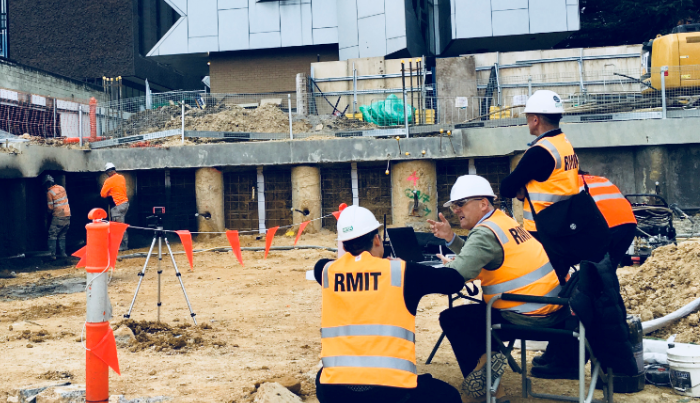The mission of Construction Work Health and Safety Research @ RMIT (CWHSR @ RMIT) is to bring together researchers, including academic staff and Higher Degree by Research (HDR) students, to collaborate in a program of industry-focused research to improve the health and safety of workers.
Our research is undertaken with the aim of significantly reducing the number of workers who are harmed in the course of their employment in the construction industry.
Our work addresses real-world work health and safety (WHS) challenges and our strong international linkages provide a global perspective to our research.
We are proud to share a look back at our work and achievements over the past 10 years of industry-focused collaborative research in construction work health and safety. Read about our staff, students, projects and partnerships in this easy-to-read retrospective.
Our research takes a lifecycle approach, developing, implementing and evaluating bespoke solutions to our partners’ work health and safety challenges. We can demonstrate our expertise and capability in a wide range of research areas.
Providing work environments and jobs that enable workers to be healthy, happy and productive is critical. We work with industry to understand the factors affecting the health and wellbeing of workers and help our partners to design and evaluate evidence-informed measures to effectively promote heathy and inclusive ways of working.
Work-life balance is an important issue for the construction industry, in terms of workers’ health, family functioning and organisational effectiveness. We have conducted extensive research with industry partners examining the ways that work practices impact upon workers’ ability to participate effectively in family, leisure, social and community activities. Our work is helping industry partners to support workers in achieving a healthy balance between their work and non-work lives.
Organisations are required to manage workplace safety and to reduce the risk of workplace accidents to be as low as reasonably possible. Our work investigates how workplace safety can be better integrated into the management of construction projects, including through client procurement practices, safety in design and participatory work design processes.

We conduct research in close collaboration with industry stakeholders.
We place an emphasis on the translation of research outputs into industry practice and have a strong track record in producing useable, practical tools that can be adapted and adopted for use by industry. Our research projects are developed in response to the difficulties experienced by industry (practice to research) and translated into outcomes that can easily be implemented by industry (research to practice).
It is important to us that our research makes a difference.
Address: 360 Swanston Street, Melbourne VIC 3000
Location: Melbourne City Campus
Email: cwhsr@rmit.edu.au
Phone: +61 3 9925 2230
Postal address
Construction Work Health and Safety Research @ RMIT
RMIT University
GPO Box 2476
Melbourne VIC 3001
Director
Distinguished Professor Helen Lingard
Phone: +61 3 9925 2230
Email: helen.lingard@rmit.edu.au
Deputy Director
Associate Professor Rita Peihua Zhang
Phone: +61 3 9925 3906
Email: rita.zhang@rmit.edu.au


RMIT University acknowledges the people of the Woi wurrung and Boon wurrung language groups of the eastern Kulin Nation on whose unceded lands we conduct the business of the University. RMIT University respectfully acknowledges their Ancestors and Elders, past and present. RMIT also acknowledges the Traditional Custodians and their Ancestors of the lands and waters across Australia where we conduct our business - Artwork 'Sentient' by Hollie Johnson, Gunaikurnai and Monero Ngarigo.
Learn more about our commitment to Indigenous cultures